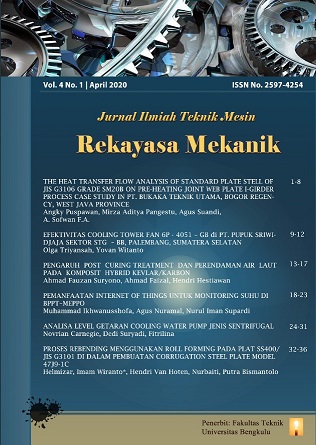Main Article Content
Abstract
Keywords
Article Details
References
- Jones, “Mechanics of Composite Materials”, Washington D.C., USA, 1975.
- Schwartz, “Composite Materials Hand Book”, New York, 1984 .
- Diharjo dan Triyono, “Buku Pegangan Kuliah Material Teknik”, Universitas Sebelas Maret, Surakarta, 2003.
- William D. Callister, Jr., “Fundamentals of Materials Science and Engineering”, Department of Metallurgical Engineering, University of Utah, 2001.
- Onny, “Proses pembuatan serat carbon”, 2016.
- Tamaela, V, “Karakteristik Curing 80oC dan 100oC Komposit Serat E-Glass”, Skripsi Teknik Mesin, Fakultas Sains dan Teknologi, Universitas Sanata Dharma. Yogyakarta, 2016.
- Febriyanto, S., “Penggunaan Metode Vacuum Assited Resin Infusion Pada Bahan Uji Komposit Sanwidch Untuk Aplikasi Kapal Bersayap Wise-8”, Skripsi, 2011.
- ASTM D3039, “Standard Test Method for Tensile Properties”.
- ASTM D6641, “Standard Test Method for Compressive Properties”.
- ASTM D5379, “Standard Test Method for Shear Properties”
References
Jones, “Mechanics of Composite Materials”, Washington D.C., USA, 1975.
Schwartz, “Composite Materials Hand Book”, New York, 1984 .
Diharjo dan Triyono, “Buku Pegangan Kuliah Material Teknik”, Universitas Sebelas Maret, Surakarta, 2003.
William D. Callister, Jr., “Fundamentals of Materials Science and Engineering”, Department of Metallurgical Engineering, University of Utah, 2001.
Onny, “Proses pembuatan serat carbon”, 2016.
Tamaela, V, “Karakteristik Curing 80oC dan 100oC Komposit Serat E-Glass”, Skripsi Teknik Mesin, Fakultas Sains dan Teknologi, Universitas Sanata Dharma. Yogyakarta, 2016.
Febriyanto, S., “Penggunaan Metode Vacuum Assited Resin Infusion Pada Bahan Uji Komposit Sanwidch Untuk Aplikasi Kapal Bersayap Wise-8”, Skripsi, 2011.
ASTM D3039, “Standard Test Method for Tensile Properties”.
ASTM D6641, “Standard Test Method for Compressive Properties”.
ASTM D5379, “Standard Test Method for Shear Properties”

